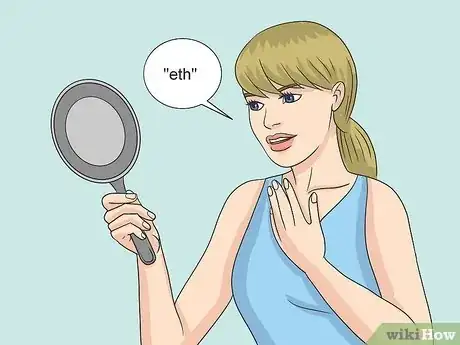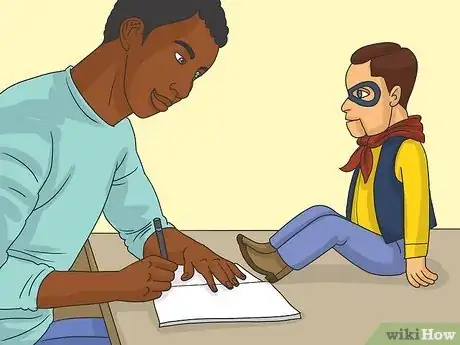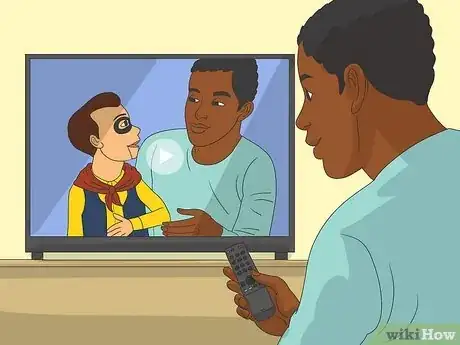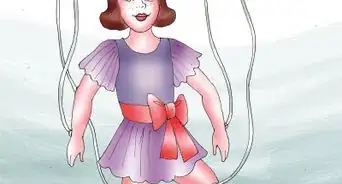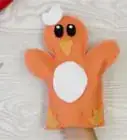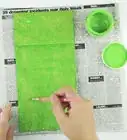This article was co-authored by wikiHow staff writer, Sophia Latorre. Sophia Latorre is a Content Manager on the wikiHow team. Before joining wikiHow, Sophia worked as a technical editor and was published in six International Energy Agency (IEA) Wind Annual Reports. Now, she writes, edits, and reviews articles for the wikiHow Content Team, working to make the content as helpful as possible for readers worldwide. Sophia holds a BA in English from Colorado State University.
There are 7 references cited in this article, which can be found at the bottom of the page.
This article has been viewed 37,881 times.
Learn more...
Ventriloquism is the art of making a figure or dummy look like it is talking. Whether you want to learn ventriloquy for fun or to make a career out of it, you only need to follow a few simple steps. Do your research and learn about past and current ventriloquists and take performing arts classes. Then, create a character, choose a figure, and practice animating it. Work on speaking with your mouth partially closed and throwing your voice, then create a skit or scene for you and your puppet to share. With a little time and dedication, you can learn ventriloquism.
Steps
Studying Ventriloquism
-
1Take lessons in ventriloquy. Ventriloquy lessons can provide you with valuable knowledge about creating characters and voicing and animating your puppet. Look for a performing arts school in your area that offers classes or workshops in ventriloquy. If you can’t find classes in your area, you can take online courses for ventriloquy. Do an Internet search to find courses and read reviews to help you choose the most helpful course available.[1]
-
2Attend theatre, improv, comedy, or acting classes. Studying any of the performing arts will help you develop the showmanship needed for ventriloquy. Taking theatre, improv, comedy, or acting classes can give you the confidence and skills you need to become a successful ventriloquist. You’ll learn how to cultivate stage presence, play to an audience, and think on the fly.[2]Advertisement
-
3Research famous ventriloquists. Read books and watch videos about ventriloquists to learn as much as you can about the art. Some famous ventriloquists you may want to research include Ronn Lucas, Shari Lewis, Edgar Bergen, Jeff Dunham, Terry Fator, Paul Winchell, and Jay Johnson. Try to go to as many live shows as you can to find out what kind of show would be best suited to your own personality and skills.
-
4Go to the Vent Haven International Ventriloquist Convention if possible. Each year, the Vent Haven International Ventriloquist Convention is held in Kentucky over the course of 3 days in the summer. If you can make it, it’s a great opportunity to meet and interact with new and seasoned ventriloquists, including famous ones! The convention also offers courses for both kids and adults to learn ventriloquy. For more information, go to http://vhconvention.com/.[3]
- Registration for the convention costs $145.
Developing a Character
-
1Choose a character. Spend some time thinking of a funny character that you think you could make come to life. It’s a good idea to make the character somewhat different from your own personality. Contrasting stage personalities will make for a more interesting and entertaining performance. However, you’re not limited to a human character—a robot, animal, or object could work too![4]
- For instance, Jeff Dunham has a figure of a pepper that he calls José Jalapeño.
- If you are shy and conservative, make your character more outgoing and liberal.
-
2Create a backstory for the character. In order to make your character believable and three-dimensional, you’ll need to spend some time developing a backstory. Think about how the character came to be here, with you, on stage for a performance. Consider the character’s family, education, socioeconomic status, religion, experiences, likes, dislikes, goals, and dreams.[5]
- For instance, maybe your character comes from a religious family in the deep south.
- Alternatively, your character could be an Egyptian prince.
-
3Pick a figure that matches the character. The figure can be an animal, person, or object, so let your creativity shine when choosing a figure. A simple sock can work well to start with, and you can move to felt figures and carved puppets later. Choose a figure whose mouth you can move, and that can be animated in another way as well, like by moving their eyebrows or raising their hand.[6]
- If you’ve chosen a sports fanatic for your character, a human figure dressed in football pads and a jersey would work well.
- Look online for a wide range of available figures.
-
4Practice animating the puppet. It’ll take some time for you to get familiar with your puppet, so you’ll need to practice making the puppet’s mouth and other parts move realistically. The goal is to make the puppet come to life. Carry the puppet with you to school, while running errands, or visiting friends and family. Practice making the puppet speak and move while you’re talking to people to give you practice without the additional stress of performing a comedic routine.[7]
- For instance, have the puppet raise its eyebrows when asking a question or considering something. Move the puppet’s head to nod when agreeing with something.
Speaking for Your Puppet
-
1Choose a vent voice. A vent voice is a voice for the puppet. The vent voice should sound different from your own voice to make it more believable. Your puppet may have an accent or use different slang than you do. The vent voice may also be slower or faster than your own voice.[8]
- For example, if your puppet is a valley girl, make it say “like” frequently and have an enthusiastic voice.
-
2Practice speaking without moving your lips. While looking in a mirror, smile with your lips parted and your teeth lightly touching. Practice moving your tongue. If you can see your tongue moving, adjust your smile until you can’t see it moving. Work on saying the letters a, c, d, e, g, h, i, j, k, l, n, o, q, r, s, t, u, x, and z without moving your lips.[9]
- For the trickier letters, you’ll make substitutions. Say d for b, “eth” for f, n for m, t for p, “thee” for v, and “oi” for w and y.
-
3Learn to throw your voice. Throwing your voice means making it seem as though you are not the one talking. To make your voice sound distant from your body, begin by taking a deep breath through your nose. Raise your tongue so that it’s almost touching the roof of your mouth to create a muffled sound. Tighten your stomach muscles and speak while exhaling slowly. Practice speaking this way as much as possible until it feels natural and convincing.[10]
Performing an Act
-
1Create dialogue for a scene. You’ll want to create original material for your scene, rather than choosing jokes that people may have already heard. Work on creating an original scene with convincing back-and-forth dialogue between you and your puppet. Pick a topic that people can relate to, like family vacations, relationships and romance, or traffic jams.[11]
- Study the way people speak to each other so you know where to incorporate sighs, pauses, and words like, “um” or “er.”
-
2Direct the audience’s eye toward the puppet when it is “speaking.” What makes ventriloquy work is the fact that people will associate the sound they hear, which is your voice, with the movement they see, which should be the puppet’s mouth, rather than your own. So, when the puppet is speaking, move the mouth and make gestures to grab the audience’s attention.[12]
- For instance, raise your puppet’s arm when it is saying “Me, me, me!” or have it slump over when you deliver bad news.
-
3Practice in the mirror or record yourself. Once you’ve come up with dialogue for a scene, practice it in the mirror or record yourself and watch the video afterwards. Take note of which words or sentences look and sound believable, and which don’t. Pay attention to the way your puppet looks while you’re moving it and try to make it seem as life-like as possible. Keep practicing until the routine is flawless.[13]
-
4Play to the audience. If you are having fun on stage, chances are the audience will be enjoying themselves as well. Let your passion for ventriloquism shine through. Speak as loudly and clearly as you can, and don’t forget to use facial expressions and gestures for both yourself and your puppet. Make eye contact with audience members or even include them in your skit![14]
Community Q&A
-
QuestionI have an owl puppet that doesn't move it's mouth. Is it still okay if I make it talk, or is that a little weird?
 DeckTheHallsCommunity AnswerI'm not sure if it's "weird", per se, but if you're planning to do public shows, you may want to invest in a good puppet. I found a decent set of Muppet-like puppets on Oriental Trading's website, a set of 8 for 30 bucks. I use them all the time because I have a lot of younger siblings/cousins.
DeckTheHallsCommunity AnswerI'm not sure if it's "weird", per se, but if you're planning to do public shows, you may want to invest in a good puppet. I found a decent set of Muppet-like puppets on Oriental Trading's website, a set of 8 for 30 bucks. I use them all the time because I have a lot of younger siblings/cousins. -
QuestionWhat if my puppet is designed to look like a certain celebrity? Should I make him like the celebrity or a brand new character?
 Community AnswerIt's up to you. If you think you can do a pretty good impression of that celebrity, go for it. If not, try to come up with a totally different personality/voice.
Community AnswerIt's up to you. If you think you can do a pretty good impression of that celebrity, go for it. If not, try to come up with a totally different personality/voice. -
QuestionHow do I create a voice for my puppet?
 Community AnswerAdjust the frequency your voice is leaving your mouth at, and introduce dialect that would make sense for your character.
Community AnswerAdjust the frequency your voice is leaving your mouth at, and introduce dialect that would make sense for your character.
References
- ↑ https://www.theartcareerproject.com/become/ventriloquist/
- ↑ https://www.theartcareerproject.com/become/ventriloquist/
- ↑ https://parade.com/599600/nancyberk/agts-darci-lynne-makes-ventriloquism-cool-4-things-to-know-if-your-child-or-you-wants-to-learn/
- ↑ http://www.carolgreene.com/education/vent/talk.html
- ↑ https://www.themagiccafe.com/forums/viewtopic.php?topic=120370&forum=182
- ↑ http://www.carolgreene.com/education/vent/talk.html
- ↑ https://www.brownielocks.com/ventriloquism.html
- ↑ https://www.themagiccafe.com/forums/viewtopic.php?topic=120370&forum=182
- ↑ http://boyslife.org/hobbies-projects/funstuff/28635/learn-how-to-be-a-ventriloquist/
- ↑ http://www.newhealthadvisor.com/How-to-Throw-Your-Voice.html
- ↑ https://www.brownielocks.com/ventriloquism.html
- ↑ http://boyslife.org/hobbies-projects/funstuff/28635/learn-how-to-be-a-ventriloquist/
- ↑ https://www.brownielocks.com/ventriloquism.html
- ↑ http://www.carolgreene.com/education/vent/talk.html









